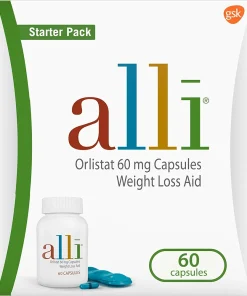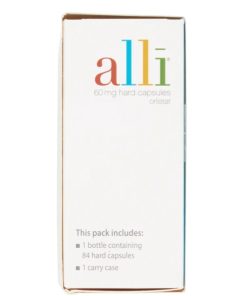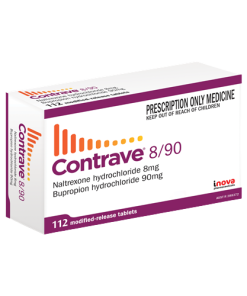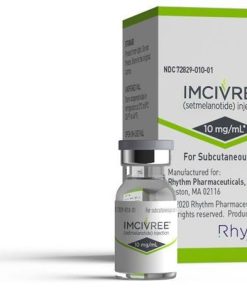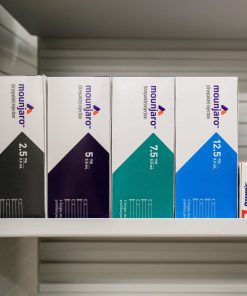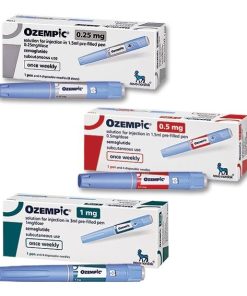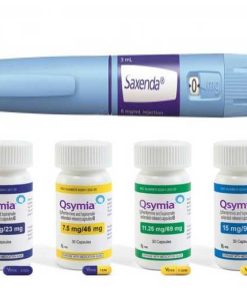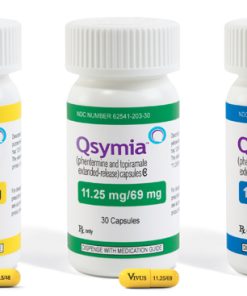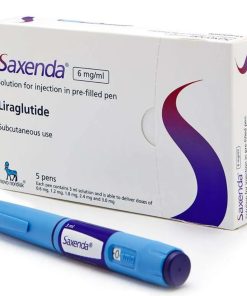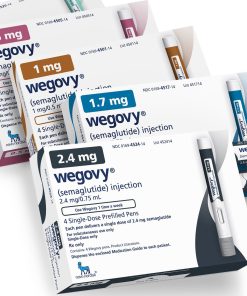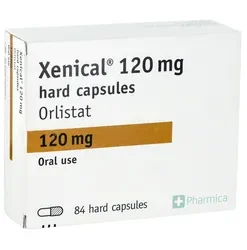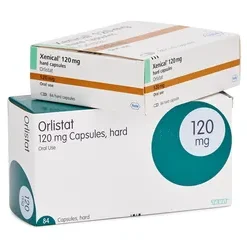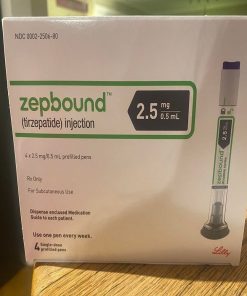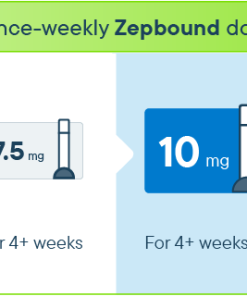Top Weight Loss Medications/Criteria for Weight Loss Medication Prescriptions/How do weight loss medications work? /Currently Available Weight Loss Medications/How effective are weight loss medications?/What is the strongest weight loss prescription medication?/Are there medications that can cause weight gain?/ How should weight loss medications be used in conjunction with other forms of treatment?/How long do weight-loss medications need to be taken?/How do the different categories of weight loss medications compare in terms of cost?/What are the differences between OTC and prescription weight loss medications?/What is the connection between antidepressant medication and weight loss/Best fat burner supplements/Which weight loss medications are known for suppressing appetite?/Semaglutide (Wegovy, Ozempic)/Tirzepatide (Zepbound,Mounjaro)/Liraglutide (Saxenda)/Phentermine (Adipex,Suprenza)/Phentermine-topiramate (Qsymia)
There is growing interest in the pharmacological treatment of obesity. Before 2012, there were few weight loss medications approved by the FDA. The top medications at that time were phentermine, marketed as Lomaira and Adipex-P, and orlistat, marketed as Xenical and Alli.
The advent of Glucagon-like peptide-1 receptor agonists (GLP-1 receptor agonists), with brand names like Wegovy and Ozempic, has attracted explosive media attention. According to a study published in 2022 in Frontiers in Cardiovascular Medicine, online searches and prescriptions for GLP-1 receptor agonists are rising in tandem.
With a wider selection of weight loss medications now available, patients may ask what the strongest or most effective weight loss prescription medication is. The answer is complicated. It is not always easy to determine which medication is right for a particular individual. The market is also rapidly changing, so it is important to keep pace with the available options and their pros and cons.
Criteria for Weight Loss Medication Prescriptions
Determining whether someone is a candidate for weight loss medications begins with BMI. Most medications are prescribed for someone with a BMI (Body Mass Imdex) of 30 or greater, or a BMI of 27 or greater if the person has weight-related health conditions.
Zepbound was approved in November 2023 for adults with a BMI of 30 or greater. For each individual case, the doctor and patient should discuss the patient’s current health issues and other medications and family medical history. The medication’s cost and side effects will also affect the decision.
While some weight loss medications are approved by the FDA only for adults, semaglutide, liraglutide, and orlistat are approved for children aged 12 and older. All of the medications discussed here are contraindicated for pregnancy.
Currently Available Weight Loss Medications
Some weight loss medications have been on the market for many years, and new ones emerge frequently. Commonly prescribed weight loss medications include:
Semaglutide (Wegovy, Ozempic)
Wegovy is a brand name for semaglutide, a GLP-1 receptor agonist. It was FDA approved in 2021. It is administered as an injection and approved for use in adults and children aged 12 years or more with obesity (BMI ≥30 for adults, BMI ≥ 95th percentile for age and sex for children) or some adults with excess weight (BMI ≥27) (overweight) who also have weight-related medical problems. The dose must be increased gradually over 16 to 20 weeks to arrive at the 2.4 mg dosage. This progression can help to alleviate side effects, which include gastrointestinal symptoms, headache, dizziness, and fatigue.
Ozempic is the same medication but is approved to treat type 2 diabetes.
Tirzepatide (Zepbound, Mounjaro)
Tirzepatide was previously approved to treat type 2 diabetes as Mounjaro. As Zepbound, it is approved to treat obesity in adults with a BMI of 30 or greater.
It is both a GLP-1 and a GIP receptor agonist and, like semaglutide, works by reducing appetite and is meant to be used in combination with diet and exercise to lose weight. It is also administered as an injection.
Liraglutide (Saxenda)
Liraglutide is a daily injectable medication that acts on hormones from the gut that send signals to the brain to make the patient feel full quicker and decrease hunger signals. Doses start at 0.6 mg to 3 mg a day. Some patients may lose 5–10% of body weight, especially with the liraglutide higher dose.
Side effects include nausea, diarrhea, constipation, vomiting, headache, decreased appetite, dyspepsia, fatigue, dizziness, abdominal pain, increased lipase, and renal insufficiency. It is contraindicated in patients with personal or family history of medullary thyroid carcinoma or Multiple Endocrine Neoplasia syndrome type 2.
Phentermine (Adipex, Suprenza)
Phentermine is the oldest and most widely used weight loss medication. It was originally used as a short-term medication to jump-start weight loss, but now newer medical guidelines have added it to long-term therapy. Some patients may lose about 5% of their body weight by taking phentermine.
In the US, phentermine is almost exclusively available in the HCl formulation – available in 15 mg and 30 mg strength. Side effects include headache, overstimulation, high blood pressure, insomnia, rapid or irregular heart rate, and tremor.
Interactions may occur during or within 14 days following the use of monoamine oxidase (MAO) inhibitors, sympathomimetics, alcohol, adrenergic neuron-blocking drugs, and possibly some anesthetic agents.
Phentermine-topiramate (Qsymia)
Topiramate can be combined with phentermine to decrease appetite and cravings. Having the combination of two drugs increases efficacy.
Adults with migraines and obesity are good candidates for this weight-loss medication. Some patients may lose an average of 5–10% of body weight.
If more than 5% weight loss is not achieved after 12 weeks of the maximum dose, the weight loss pill should be gradually discontinued.
Daily doses with four strengths start at 3.75 mg/23 mg to 15 mg/92 mg. Side effects include abnormal sensations, dizziness, altered taste, insomnia, constipation, and dry mouth. Contraindications include uncontrolled hypertension and coronary artery disease, hyperthyroidism, glaucoma, and sensitivity to stimulants.
Naltrexone-bupropion (Contrave)
Naltrexone-bupropion combines an opioid receptor antagonist with an antidepressant to affect the pleasure-reward areas of the brain and thereby decrease cravings and appetite. Some patients may lose 5–10% of body weight.
Start with a daily dose of one 8/90 mg tablet and gradually increase to four tablets a day. The most common side effects include nausea, constipation, headache, vomiting, dizziness, insomnia, dry mouth, and diarrhea. This medication should not be prescribed to a patient who has a seizure disorder or who takes opioids for chronic pain.
Setmelanotide (Imcivree)
Setmelanotide is a melanocortin-4 receptor agonist indicated for chronic weight management in adult and pediatric patients 6 years of age and older with obesity due to one of several specific rare genetic disorders.
The condition must be confirmed by genetic testing demonstrating variants in POMC, PCSK1, or LEPR genes that are interpreted as pathogenic, likely pathogenic, or of a variant of uncertain significance (VUS).
Orlistat (Xenical and Alli)
Orlistat is a lipase inhibitor that comes in a capsule and works by blocking the enzyme that breaks down fats consumed through food. In this way, it inhibits the absorption of dietary fats.
Undigested fat is then passed through the body. It is intended for use in conjunction with a reduced-calorie diet and is also indicated to reduce the risk of weight regain.
Some patients may lose about 5% of their body weight. Dosage is one 120 mg capsule three times a day with each main meal containing fat (during or up to 1 hour after the meal).
An over-the-counter formulation is available at 60 mg capsule with each meal containing fat. The most common adverse reactions to orlistat are oily discharge from the rectum, flatus with discharge, increased defecation, and fecal incontinence.
Hydrogel (Plenity)
A medical device rather than a medication, Plenity was FDA-cleared in 2019 for people with a BMI of 24 to 40. The treatment has experienced increased media attention since the rise of GLP-1 receptor agonists.
It consists of a capsule that releases a biodegradable, super-absorbent hydrogel into the stomach. The gel helps to increase satiety, enabling the person to eat less. The average weight loss in real-world studies is 9%.
More detailed information about each of the above weight loss medications can be found in the latest edition of Obesity Medicine Association’s Obesity Algorithm®.
Upcoming Weight Loss Medications
With fervent consumer demand for weight loss medications, combined with rising obesity rates, more medications are bound for the market in the coming years.
Lilly is developing orforglipron, an oral GLP-1 inhibitor. Retatrutide, another injectible, targets GLP-1, GIP, and glucagon. Pfizer is also developing two GLP-1 inhibitors that can be administered as pills. Meanwhile, Amgen is trialing a drug candidate that is both a GLP-1 receptor agonist and a GIP receptor antagonist, as opposed to a dual agonist like semaglutide.
Researchers continue to seek hormones that play a role in appetite, such as peptide YY, for other ways to target obesity with medication.
Interviewed by Endocrine News in 2021, Robert Kushner, MD, a professor at the Northwestern University Feinberg School of Medicine, lauded “the new direction that we are going in obesity treatment, treating it more as an endocrine disease, treating it hormonally…”—giving patients and providers different options to choose the drug that will be the most useful.
Monoclonal antibodies are another “hot” category in drug development for a range of diseases, including obesity. For example, the monoclonal antibody bimagrumab is being studied as an infusion to increase muscle mass while decreasing fat.
With more options available, doctors will be increasingly able to personalize treatments as they match patients to the medications that will work best for them. For more information on these new options, enroll in OMA’s course on Future Advances in Anti-Obesity Medications.
Frequently Asked Questions About Weight Loss Medications
How effective are weight loss medications?
FDA-approved anti-obesity medications (AOMs) are safe, evidence-based therapies that target specific physiology to improve the disease and are most effective when they are used as part of a comprehensive treatment plan. The amount of weight a person loses depends on the medication they take, their overall health, and other individual factors.
Even as the range of weight loss medications has expanded, some drugs have been withdrawn based on their lack of efficacy as well as safety concerns.
What is the strongest weight loss prescription medication?
The amount of weight loss possible with semaglutide, according to clinical studies, is significant. A 2022 study of 175 individuals showed 5.9% weight loss at three months and 10.9% at six months. A larger study published in the New England Journal of Medicine showed even greater average loss—14.9%. However, drawbacks of semaglutide include high cost, side effects, and the long-term to indefinite length of treatment.
As with all obesity treatment, a person might experience better results with one medication over another. Each person, in partnership with their doctor, should try to find the right combination of treatments that work best for them.
In 2022, The American Gastroenterological Association released recommendations for weight loss medications among patients with obesity who do not respond adequately to lifestyle interventions alone. They listed four first-line options:
- Semaglutide
- Liraglutide
- Phentermine-topiramate extended-release (ER)
- Naltrexone-bupropion extended-release (ER)
They also recommended phentermine and diethylpropion. Note that these recommendations were made before the approval of Zepbound.
How do weight loss medications work?
They work primarily by regulating hormones in the brain, digestive system, and adipose tissue to suppress appetite and cravings and promote satiety.
Some medications are administered orally and others as subcutaneous injections. When patients ask about weight-loss pills vs. injections, they tend to refer to the two options for GLP-1 RAs. Data released in May 2023, separately by Novo Nordisk and Pfizer, stated that pills and injections are about equally effective.
Are there medications that can cause weight gain?
There are many medications that can be obesogenic or can cause weight gain. Following medications can potentially cause variable weight gain in some individuals.
- Some beta-blockers and calcium channel blockers
- Anti-diabetes medications such as insulins, sulfonylureas, thiazolidinediones, and meglitinides
- Hormone therapies such as glucocorticoids and injectable progestins
- Anti-seizure medications, including carbamazepine, gabapentin, valproate, and pregabalin
- A wide variety of different antidepressants
- Some mood stabilizers
- Migraine medications such as amitriptyline and paroxetine
- Some antipsychotics
- Chemotherapeutic and anti-inflammatory agents
How should weight loss medications be used in conjunction with other forms of treatment?
A treatment plan for obesity can comprise multiple forms of treatment, including medications, diet, exercise, and/or surgery. All weight loss medications work best in the context of a healthy eating plan and exercise. Even when a patient is engaging in exercise and other lifestyle adjustments, medications can help with hunger, cravings, and metabolic preservation.
How long do weight-loss medications need to be taken?
Some weight management medications are designed for short-term use and others for long-term use. For example, some are approved by the FDA for up to 12 weeks.
Those approved by the FDA for long-term use include orlistat (Xenical, Alli), phentermine-topiramate (Qsymia), naltrexone-bupropion (Contrave), liraglutide (Saxenda), semaglutide (Wegovy, Ozempic), and tirzepatide (Zepbound, Mounjaro).
The dosing for some of these includes a long ramp-up period—up to five months—to reach full dosage. Keep in mind that obesity is a disease, and no drug can permanently “cure” it.
How have options in weight loss medications changed in recent years?
While GLP-1 RAs have grabbed a lot of headlines, they are only the latest in a long history of evolving weight loss medications. A 2022 article in Life Science explains:
“…as more physiological mechanisms for weight gain have been unearthed, drugs targeting newly discovered receptors and/or enzymes have been introduced with improved safety profiles and fewer psychological adverse events. Additionally, drugs targeting hunger or satiety signaling have been actively studied and have shown increased adoption by physicians. Studies have also evaluated drugs that target metabolic tissues—such as adipose tissue or muscle—to promote weight loss, however to-date nothing has carried on into clinical practice.”
Undoubtedly, new candidates will continue to be developed, and some will come to market.
How do the different categories of weight loss medications compare in terms of cost?
As with any medications, some weight loss drugs have been on the market longer, have generic alternatives, and tend to be more affordable. GLP-1 RAs are notoriously costly. The Kaiser Family Foundation estimates the annual estimated net price of Wegovy at $13,600. According to GoodRx, phentermine can be had for as little as $10.
Insurance coverage varies and will affect many patients’ choices about going on weight loss medications. Medicare does not cover weight loss drugs.
How do they affect weight regain?
AOMs may counter the effects of metabolic adaptation and prevent weight regain. After weight reduction, the body metabolically adapts, often causing an increase in hunger hormones and a decrease in satiety hormones and resting metabolic rate, all of which can contribute to weight regain. If the patient achieves clinically meaningful weight reduction with anti-obesity medications and if the clinician and patient feel that the medication is helping to avoid weight regain, then a weight reduction plateau should not be considered a point where medication should be discontinued, but rather the medication should be continued for weight reduction maintenance.
What are the differences between OTC and prescription weight loss medications?
The only over-the-counter medicine for weight loss currently approved by the FDA is Alli (orlistat). Other over-the-counter products are considered supplements. They are not regulated by the FDA and do not have proper studies to confirm their safety and effectiveness.
With prescription medications, a healthcare professional can weigh all factors affecting the patient’s lifestyle and BMI, and also monitor progress and side effects. This relationship can allow for dosage adjustments or alternative medications if one seems like a better fit for the patient.
What is the connection between antidepressant medication and weight loss?
Many antidepressants are weight-positive (cause weight gain), some are weight-neutral, and at least one is weight-negative (causes weight loss).
Antidepressants are broken down into categories: selective serotonin reuptake inhibitors (SSRIs), serotonin and norepinephrine reuptake inhibitors (SNRIs), tricyclic antidepressants, monoamine oxidase inhibitors (MAO inhibitors), and others. Medications within each of these categories can cause weight gain.
In the SSRI group, Paroxetine shows the highest associated weight gain. Other SSRIs, including Citalopram (Celexa), Escitalopram (Lexapro), Fluoxetine (Prozac), and Sertraline (Zoloft), have variable effects on weight, and some do not show weight gain until after six months of use.
Weight-positive medications in the tricyclic antidepressant category include Amitriptyline, Doxepine and Imipramine. Desipramine, Nortriptyline, and Protriptyline have variable effects on weight.
Bupropion (Wellbutrin), an aminoketone is considered weight-negative and is prescribed both to assist in weight loss and to treat depression. However, people respond to antidepressants differently.
Which weight loss medications are known for suppressing appetite?
The following FDA-approved medications suppress appetite: Tirzepatide (Zepbound), Liraglutide (Saxenda), Naltrexone-Bupropion (Contrave), Phentermine-Topiramate (Qysmia), as well as these stimulants: benzphetamine (Didrex™), diethylpropion (Tenuate™), phentermine (Adipex-P, ProFast), and phendimetrazine. Each medicine impacts appetite differently.


